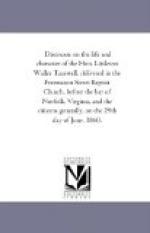Richmond set the example among us of holding meetings of the people, with a view of urging the restoration of the deposits to the Bank. Watkins Leigh and Chapman Johnson made on that occasion an appeal to the people of Virginia in favor of a restoration, which was heard from so respectable a source with the attention it deserved. The Assembly then in session, which, when elected, had been favorable to the administration of Jackson, faltered in their faith, instructed the senators in Congress to vote for a restoration of the deposits, and on the resignation of Mr. Rives, who upheld the policy of the administration, elected Mr. Leigh in his stead. Even the Richmond Enquirer, its polar star momentarily obscured, was tossing helplessly on that tempestuous sea.
In this state of things, some of the citizens of Norfolk, of both parties, as those parties had previously stood, highly distinguished by social position, by talents, by wealth, and by their intimate connection with our banking institutions, called on Mr. Tazewell, and requested him to take the chair at a public meeting to be held on the 8th of January, 1834. He consented to do so, and on taking the chair delivered one of the most graceful, most nervous, and most eloquent speeches that ever fell from his lips. In language not to be misunderstood, he denounced the act of removing the deposits from the Bank of the United States, advised their immediate restoration, and condemned the whole series of the measures of the President of the United States in relation thereto. A gentleman happening to be present who had heard Canning, Brougham, and Sir Robert Peel from the hustings and in the House of Commons, declared that the speech of Mr. Tazewell fully equalled their grandest efforts on such occasions; and all who heard it pronounced it a wonderful work of argument, eloquence, and declamation combined. A few days after the meeting, Mr. Tazewell was elected Governor of the Commonwealth.
The conduct of Mr. Tazewell on this occasion I leave to history. It was my misfortune to differ from him, and to strive against him in public meetings, by resolutions, by speeches, and by essays in the public prints, and to have been on the side of the victorious party; and I owe it to candor to say that, after a deliberate investigation of the arguments and the circumstances of that time with such faculties as God has bestowed upon me, my views through the twenty-seven years that have since passed remain unaltered; but now that my illustrious friend is gone, and as I measure that chasm which his death has made in the Commonwealth, leaving none equal to him or like him behind, and especially in my own bosom—a chasm which, at my time of life, can never, never be closed—I have looked with fear and trembling over all I said and wrote on that occasion, and I am gratified to find that, although I spoke with as great freedom of men and things as the occasion, in my opinion, demanded, I spoke personally of Mr. Tazewell as a son should speak of a father, and with that exalted respect with which I ever regarded his colossal character.




